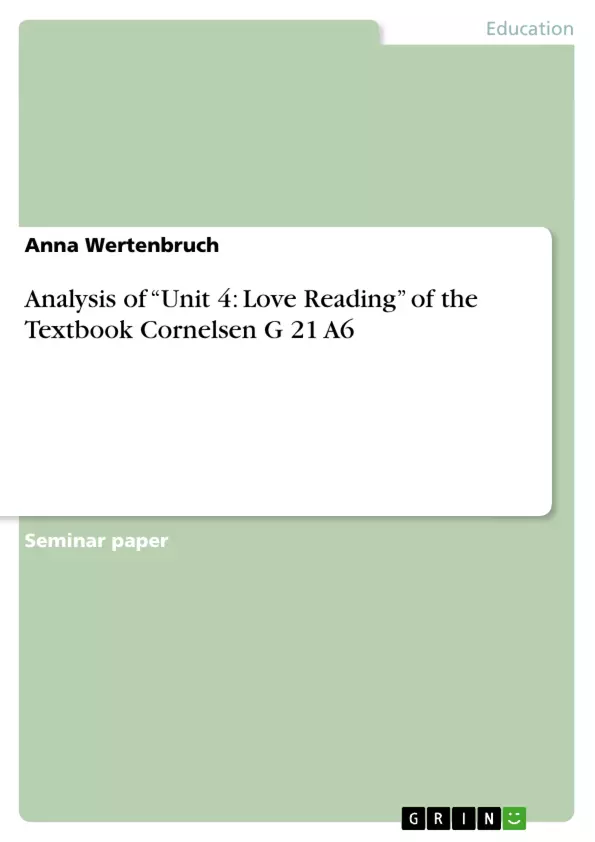“Reading is like an infectious disease: it is caught not taught. And you can’t catch it from someone who hasn’t got it himself” (Surkamp/Henseler 2).
Although reading is important to develop language skills, the survey PISA 2001 showed that 42% of the German pupils do not think that reading is fun and 31% even think that it is a waste of time. When considering the significance of reading, this is a shocking result. Nevertheless, a reason for this attitude may be the lack of reading motivation among pupils. Developing reading literacy and enjoying reading require the motivation to read. In this context not only the lessons in the mother tongue, but also the teaching of foreign languages must establish this reading motivation and a reading culture.
To prove my thesis, I will first give an overview of reasons for the regained belief that literary texts enrich the teaching of foreign languages and designate arguments for deal-ing with literature in class. In doing so, I will furthermore expose aims and functions of literary texts in the classroom and demonstrate developments and approaches in the teaching of literature. In the following part of my paper, I will have a closer look at the textbook “Cornelsen G21 A6” and its unit “Love Reading” which is about literature and reading. In analyzing this unit, I will examine if the aspects mentioned before have been considered and if the recommended approaches to literary texts have been implemented in this course book. At first the analysis of the unit will refer to its structure, the genres which are introduced and the novel “Looking for Alaska” in particular. Afterwards I will study the tasks set in the unit and methods which were applied. Finally the analysis aims at comparing the learning objectives in the unit to the central standards of the ‘Kernlehrplan English’. In the last part of my paper, I will summarize and evaluate my findings as well as discuss the actual significance of literature in the EFL classroom in reference to the fourth unit of Cornelsen G21 A6.
Inhaltsverzeichnis (Table of Contents)
- Introduction
- Aims and Functions of Literary Texts in the English Classroom
- Development and Approaches in Teaching Literary Texts
- Cornelsen G 21 A6: Unit 4 "Love Reading"
- Structure and Genres
- The novel "Looking for Alaska" in the Textbook
- Tasks and Methods
- Aims
- Conclusion
- Works Cited
Zielsetzung und Themenschwerpunkte (Objectives and Key Themes)
This analysis aims to examine the effectiveness of the "Love Reading" unit in Cornelsen G 21 A6 by analyzing its structure, tasks, and aims. The paper will also explore the role of literature in teaching English as a foreign language and argue for its significant contribution to language development, cultural understanding, and personal enrichment. Key themes of this analysis include:- The role of literature in EFL classrooms
- The effectiveness of textbook units in promoting reading motivation
- The alignment of textbook content with central standards of English language teaching
- The integration of authentic materials and diverse genres in EFL teaching
- The development of language skills and cultural awareness through literature
Zusammenfassung der Kapitel (Chapter Summaries)
Introduction
This chapter introduces the importance of reading in language acquisition and highlights the challenge of motivating students to read. It argues that incorporating literature into EFL classes is crucial for fostering reading habits and enhancing language skills. The chapter also discusses the resurgence of interest in literary texts within EFL teaching materials and attributes this to a renewed understanding of the role of literature in achieving educational objectives such as empathy and intercultural competence.Aims and Functions of Literary Texts in the English Classroom
This chapter explores various arguments in favor of using literary texts in EFL classrooms. It emphasizes the authenticity and richness of literary texts as sources for language learning and cultural insights. The chapter also explores different perspectives on the value of literature, highlighting its contribution to language development, cultural understanding, personal growth, and motivational aspects.Frequently Asked Questions
Why is literature important in the English as a Foreign Language (EFL) classroom?
Literary texts enrich language teaching by providing authentic material that fosters empathy, cultural understanding, and personal growth beyond mere grammar and vocabulary.
What did the PISA 2001 study reveal about reading habits?
The study showed that 42% of German pupils do not find reading fun and 31% consider it a waste of time, highlighting a significant lack of reading motivation.
How does the textbook "Cornelsen G 21 A6" address literature?
The textbook includes a unit titled "Love Reading" which introduces various genres and specifically features the novel "Looking for Alaska" to engage students.
What are the main functions of literary texts in class?
Their functions include language development, fostering intercultural competence, and providing motivational aspects through engaging storytelling.
Does the textbook align with official curriculum standards?
The analysis compares the unit's learning objectives with the central standards of the 'Kernlehrplan Englisch' to ensure educational compliance.
- Quote paper
- Anna Wertenbruch (Author), 2012, Analysis of “Unit 4: Love Reading” of the Textbook Cornelsen G 21 A6, Munich, GRIN Verlag, https://www.grin.com/document/208451



